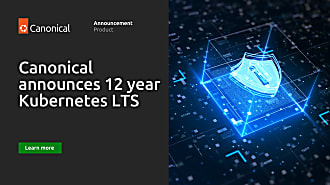Canonical
on 15 October 2020
Introducing HA MicroK8s, the ultra-reliable, minimal Kubernetes

15th October 2020: Canonical today announced autonomous high availability (HA) clustering in MicroK8s, the lightweight Kubernetes. Already popular for IoT and developer workstations, MicroK8s now gains resilience for production workloads in cloud and server deployments.
High availability is enabled automatically once three or more nodes are clustered, and the data store migrates automatically between nodes to maintain a quorum in the event of a failure. “The autonomous HA MicroK8s delivers a zero-ops experience that is perfect for distributed micro clouds and busy administrators”, says Alex Chalkias, Product Manager at Canonical.
Designed as a minimal conformant Kubernetes, MicroK8s installs and clusters with a single command.
“A substantial part of our work at MavenCode is focused on operationalising machine learning model pipelines for production deployment at scale with Kubeflow. MicroK8s comes in handy for our Data Scientists and ML Engineers to quickly prototype, build, and deploy these pipelines. MicroK8s is very easy to set up and configure, extremely lightweight and it easily emulates our production environments for seamless migration and deployment of the pipelines. This has really helped improve our team’s overall operational efficiency,” said Charles Adetiloye, Co-founder and MLOps Platform Engineer, MavenCode.
HA MicroK8s can withstand the loss of any node and still provide reliable services, meeting production requirements with minimal administrative costs and oversight.
Failsafe, autonomous Kubernetes datastore
The datastore which makes this possible is Dqlite, Canonical’s raft-enhanced Sqlite, embedded inside Kubernetes. Dqlite reduces the cluster memory footprint and automates datastore maintenance. MicroK8s can also be configured to use etcd, but Dqlite provides automatic, autonomous high availability.
MicroK8s automatically chooses the best nodes to provide the datastore. In case of a datastore node failure, the next best node is automatically promoted in its place. MicroK8s manages its own control plane, ensuring API services remain up and running.
Automated, reliable operations at the edge
The increased resilience of HA MicroK8s benefits Kubernetes clusters on edge nodes, such as remote branch office racks, retail points of sale, cell towers, or cars.
Distributed micro clouds make human intervention expensive, so the zero-ops nature of HA MicroK8s greatly reduces manual operations costs. Snap packaging of MicroK8s provides compressed over the air updates, transactional rollbacks and automatic security patching to reduce exposure in unmanned environments, especially for mission-critical workloads.
Kubernetes for industrial IoT
HA MicroK8s hardens industrial IoT applications, supporting cloud-native applications in the high stakes environment of operation technology (OT). Industry 4.0 workloads such as AI inference, or connectivity microservices like OPC-UA, MQTT and Kafka are a natural fit with HA MicroK8s on mission-critical control systems.
Enterprise support
Long-term support and maintenance of MicroK8s is provided by Canonical.
Want to learn more about how HA MicroK8s works? Read our docs.
About Canonical
Canonical is the publisher of Ubuntu, the OS for most public cloud workloads as well as the emerging categories of smart gateways, self-driving cars and advanced robots. Canonical provides enterprise security, support and services to commercial users of Ubuntu. Established in 2004, Canonical is a privately held company.



